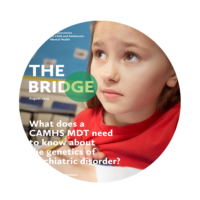Genetics
-

June 2020 – The Bridge
Includes ‘Are social networking sites contributing to depression and anxiety symptoms in young people?’
Read more -

Shared genetic risk underlies the co-occurrence of ADHD and other psychiatric symptoms
Data from twin studies suggest that the co-occurrence of ADHD with other psychiatric disorders is due, in part, to shared genetic risks.
Read more -

JCPP Editorial: Volume 61, Issue 06, June 2020
“Some roads less travelled—different routes to understanding the causes of child psychopathology” By Arne Lervåg
Read more -

‘Anxiety in the family: a genetically informed analysis of transactional associations between mother, father and child anxiety symptoms’
Video abstract from author Yasmin Ahmadzadeh summarising her paper published in the JCPP, ‘Anxiety in the family: a genetically informed analysis of transactional associations between mother, father and child anxiety symptoms’
Read more -

JCPP Editorial: Volume 61, Issue 05, May 2020
“Polygenic scores in child and adolescent psychiatry – strengths, weaknesses, opportunities and threats” by Angelica Ronald
Read more -

A polygenic score for age‐at‐first‐birth predicts disinhibition – Leah Richmond‐Rakerd video abstract
Leah Richmond‐Rakerd gives a video abstract of her paper ‘A polygenic score for age‐at‐first‐birth predicts disinhibition’ first published in Journal of Child Psychology & Psychiatry (JCPP) 27 March 2020.
Read more -

Should emotion dysregulation be considered a core component of ADHD?
New data from researchers in the USA suggest that emotion dysregulation should be included as a core component of attention-deficit/hyperactivity disorder (ADHD) rather than viewed as comorbidity.
Read more -

Teacher assessments could replace high-stake testing to improve student well-being
Many students experience anxiety and distress during exams, and these emotions can have a negative effect on achievement. Notably, one of the top-reported concerns voiced by children in the UK is the stress and anxiety associated with school work and exam performance.
Read more -
Child anxiety symptoms affect mothers via an environmental mechanism
Intergenerational anxiety associations in families are well reported, but the underlying mechanisms of anxiety transmission are unclear. Now, researchers in the UK and the USA have conducted the first genetically sensitive study to explore the effects of genetic and environmental anxiety transmission in families during middle childhood.
Read more -

Neuroscience Edition
Welcome to this Neuroscience themed edition of The Bridge.
Read more
The Royal College of Psychiatrists is currently promoting the neurosciences in its curriculum, for training Psychiatrists of the future. One of the many reasons for this is to develop more “Parity of Esteem” between physical and mental health conditions.